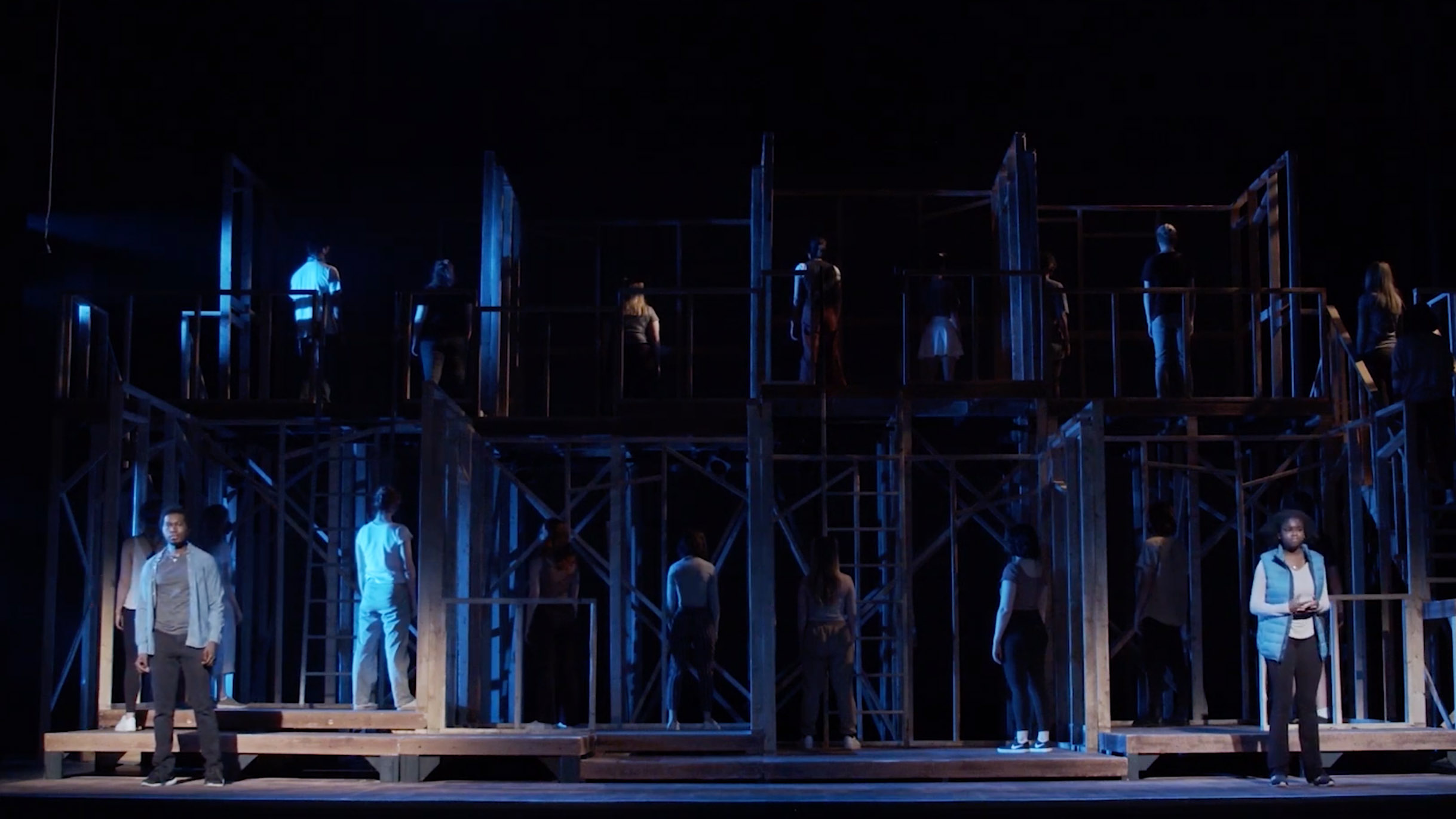Earlier this year, students in the Department of Theatre & Dance at the University of Kansas performed a collection of monologues titled Changemakers that distilled the voices and experiences which have permeated America during the pandemic. Directors Markus Potter and Darci Jens Fulcher state that, “As we were collectively reeling from the trauma of last summer along with the weight of unrest after centuries of oppression and injustice, we knew we needed to create space for our students to use their artistic voice to contribute to the many conversations we are currently grappling with as a country.” To help students participate in these conversations, the program commissioned over twenty playwrights to collaborate with students on developing a series of “original two-minute plays” that feature a character and often include the ensemble.
The series of vignettes range from the funny to the dramatic to the musical and the subsequent results are surprisingly cohesive. The process behind the pieces, as well as the specificity of the show’s exploration, help to provide a coordination between the plays. Directors Potter and Fulcher explain that “[t]he students started the process for Changemakers with creating documentary monologues from found pieces of text from social activists, local community leaders, front-line workers, politicians, or any inspiring individual who has fought for change. Our students pulled text from social media sites, news interviews, articles, books, then created documentary-style monologues along with some original monologues.” From these materials curated by the students’ interests, the playwrights wrote responsive plays inspired in part by the students.
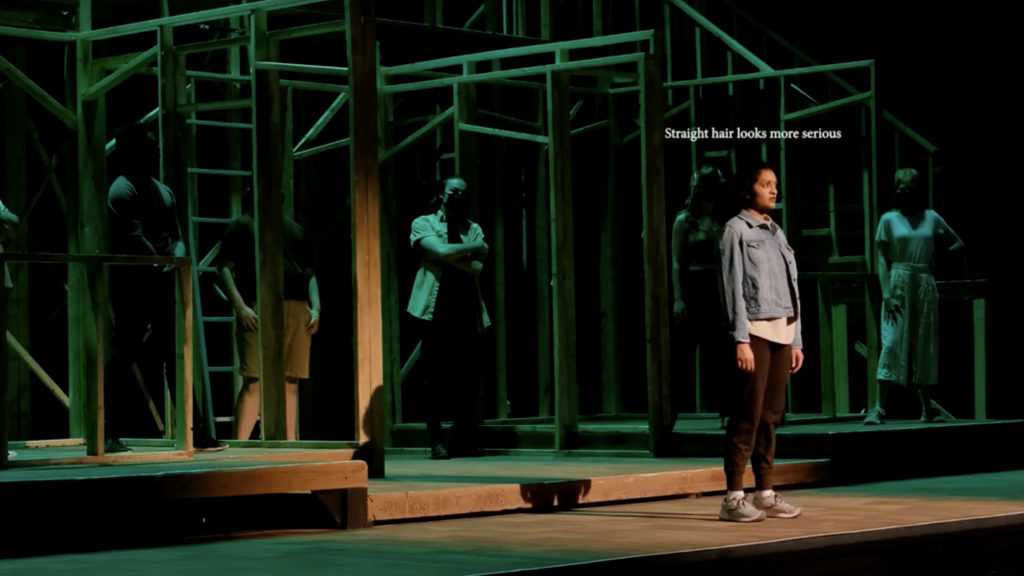
The collection begins with student actor Diego Rivera-Rodriguez performing “Pick It Up” by Andrew Saito, a more serious piece about a bar of soap. Alone on the stage, Rivera-Rodriguez evokes the beginning of the pandemic with the sudden helplessness many of us felt and the search for moments of beauty and connection. Tehreem Chaudhry followed in “The Voices” by Nandita Shenoy, an exploration of anxiety, social expectations, and racist and misogynistic standards. Here, the ensemble haunted Chaudhry’s character, standing behind her in low-lighting, their quick verbal attacks flashing on the screen next to the ensemble members as they spoke.
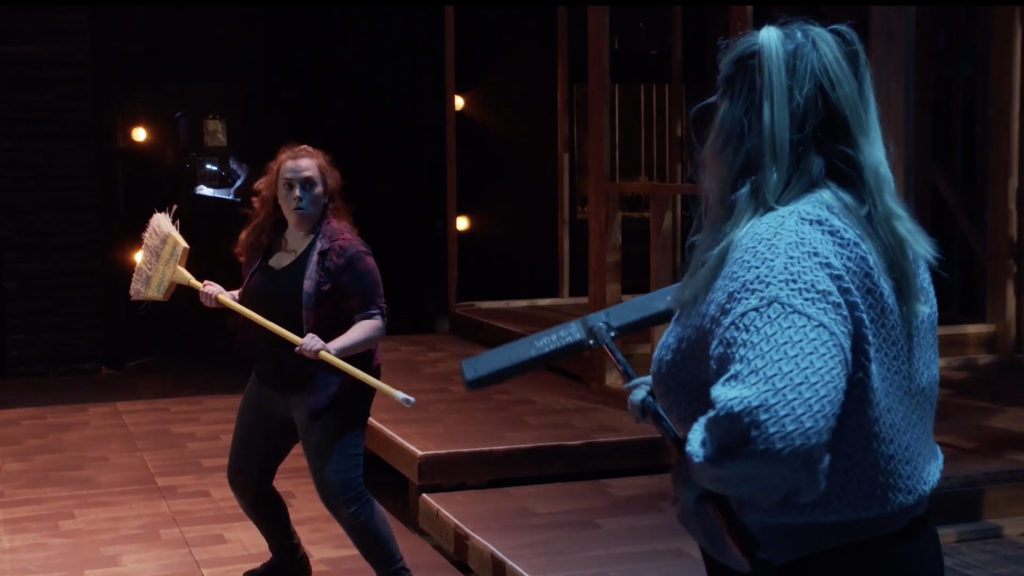
Exploring the ways COVID impacted us, the performance moved through several plays that took on a collection of specific experiences. Kennedy Brandenburg played a school teacher turned flight attendant in Chandra Thomas’s “Ladybug Day” speaking about the deaths of her teacher colleagues to COVID while walking her masked (and some anti-vaccine) passengers through the safety protocols. The grief expressed in this piece is dispersed by its successor “You Just Never Know” by David Don Miller. Haley Cogbill plays a depressed attorney who forgot her wallet for her routine trip to the local coffee shop. She rambles about how the outings have “been her only real human interaction since this whole thing started” and gives her the motivation to get fully dressed, providing her with a moment in her day when she “feels whole.” Later in the show and dressed in a hospital gown, Kalen Stockton takes us through how Sherri Eldin’s “Chaos Theory” imagines the last thoughts and experiences of a COVID patient as she dies, overlapping memory with vague awareness of the hospital room and her own death. The isolation of Eldin’s “Chaos Theory” and the attempts at communicating with the outside world are mirrored in “Open the Door” by Aimé Donna Kelly and performed by Petricia Hall. Hall monologues from inside an apartment, speaking to someone knocking on the door who doesn’t respond. The last exploration of the pandemic’s effects comes in the hilarious musical number “Changing Thru Therapy” by Bill Russell and Michael Wysong which features a broomstick fight between a therapist and her patient, played by Ella Galbraith and Mary Spencer, as they argue about giving into the urge to throw over social distancing for the sake of a hug.
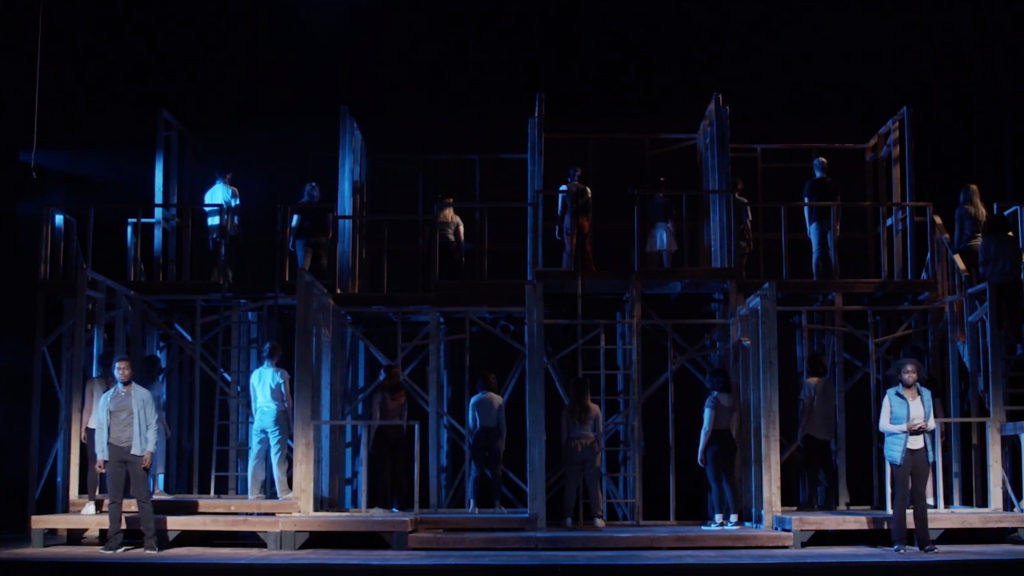
Following these, Jeremiah G. Coleman and Lewis J. Morrow’s “Fruited from Fear”, an exploration of Black-American experiences in a play which presented two perspectives performed by Jeremiah G. Coleman and Gabrielle Smith. “They fear what they don’t understand,” Coleman argues. Smith fires back “They hate what they were taught to hate.” Eventually, they agree on one point: “I’m just tired.” Another play, “Land Acknowledgment” by Vera Starbard, comments on the growing practice. It explores how hypocritical land acknowledgment statements can be when companies refuse to support their statements with initiatives and work to support, uplift, include, and give back to Native Americans and their tribes. Elijah Olson’s character asks, “So, you’re acknowledging you ‘own’ land stolen from us, which decreased our power and our wellness as a community, but you’re not following that with anything that gives us power or wellness back?” In “Mea Culpa” by Sheri Wilner, Katerine Patz plays a podcast speaker who retracts her previous episode’s advice to not dehumanize the rioters who stormed the Capitol in the January 6 insurrection. She argues that the indulgent self-righteousness of self-help doesn’t help us, instead, “in order to defeat a monster, you have to know it’s a monster.”
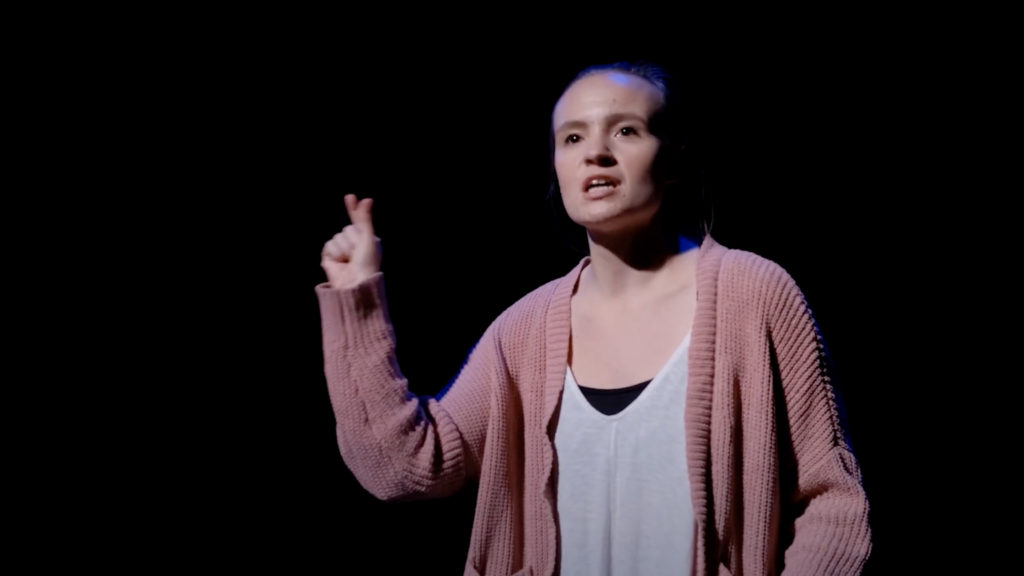
India McDonald’s “Cool Girl” begins with McDonald describing an experience of sexual harassment and then explores being a woman, arguing “we don’t allow women to be as nuanced as men” through juxtaposing two ways women often react to sexual harassment. The expectations placed on how women use or don’t use their voices is expanded in Lori Elizabeth Parquet’s “Better Late”, a monologue delivered by Aubrey McGettrick as Jen, a woman posting online about how Monica Lewinsky has finally acknowledged that the power dynamics at play negate the possibility of consent in her relationship with Bill Clinton. Jen had previously been accused online of silencing and doubting Monica Lewinsky’s experience for making the same point and celebrates Monica’s new perspective. The monologue ends on a call to Matt, the weight of the conversation to come present in the play’s final line.
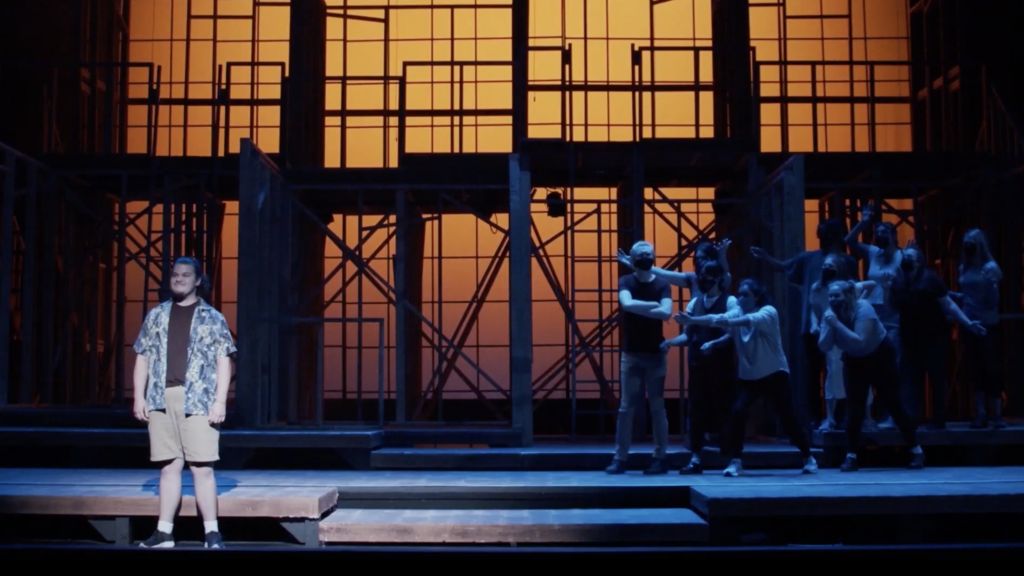
Next, Asher Suski plays a transman in “Closets” by Paris Crayton III, sharing how the conditional love of his parents and his fifteenth birthday, a day of misgendering and deadnaming that led to suicidal thoughts, was also his first birthday. It was the day he began to live as himself and examined how he would live each day to come. “I knew that a love full of limitations was no love at all…but hearing [father] say that forced me to look for my own love.” The exploration of conversations and experiences of gender and sexuality that began with “Closets” continues with Stella Rose Garibaldi and Ryan McCall’s “Still Casey,” a rather comedic musical number about a young adult’s journey through exploring sexuality and coming to the realization at the end that “I am not a girl.”
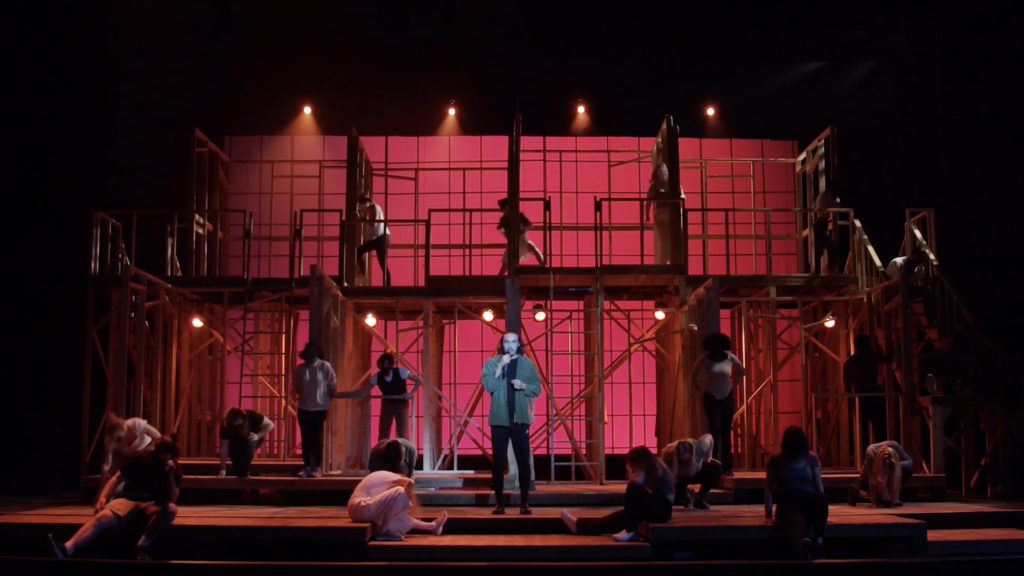
Chris Pendry inspired SEVAN’s “Dinosaur,” an exploration of perspective difference across the generational gaps. The monologue discusses the pressures placed on younger generations and calls for a displacement of resentment for older generations in order to focus on the problems that need resolutions. Another, and the most metatheatrical, vignette was James Still’s “Now Is The Time to Lock Eyes and Arms” which explores a young 19-year-old art student’s desire to listen, speak, and participate in the work of healing from injustice. In this piece, Lauren K. Smith plays a character who highlights a similar generational resentment, this time for its role in the fight for equality.
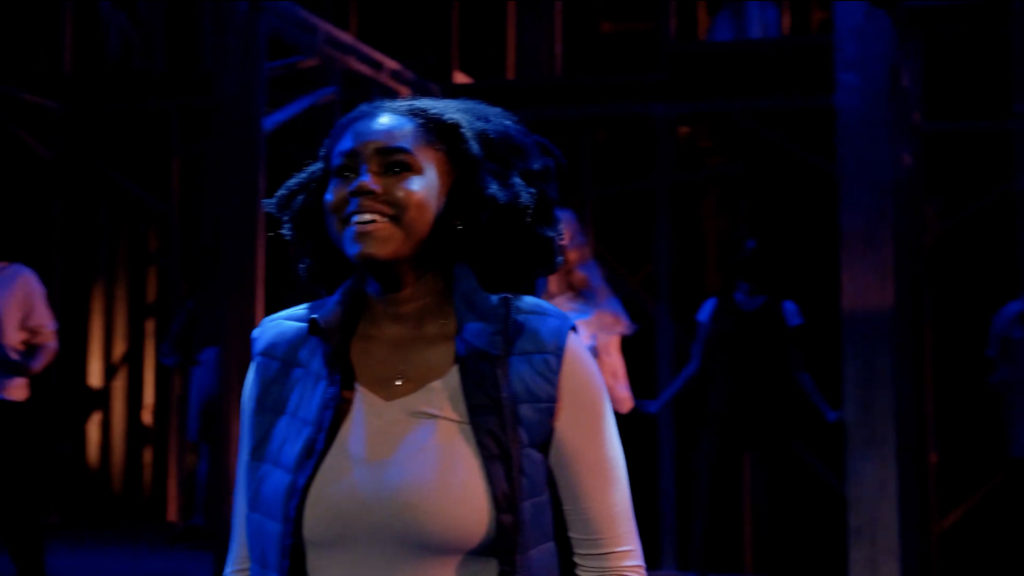
“Angel Amongst the Ruins” by Rodney Hicks gives Gabrielle Smith the chance to speak one side of an emotional conversation as Angel, a woman who seems to be neurodivergent and living on Skid Row, and Ms. Shirley Raines, a woman who does hair for those living without housing. Angel’s final question, “can you be my new mom?” goes unanswered. The power of a familial kinship underpins Chloé Ryan and Tammy Ryan’s “Pure Love” with a phone call from the protagonist’s mother. Chloé Ryan presents a high-energy monologue of one woman trying to get through the day and her looming anxieties about the climate crisis by repeating her mantras and dancing around her apartment. That concern for the state of the climate is exploded in the following vignette “Confluence” by Leonard Madrid. Cole Gomez-Maldonado plays Francisco Javier Vera Manzanares, an 11-year old activist leading the movement in Colombia, and dives into how we discuss the climate crisis and climate activism in this environmental play about the power of individuals banding together to affect change. The note is one of hope, a message at the heart of the final piece, Stephen Kaplan’s “Popcorn.” In this vignette, Kara Stobie delivers a monologue about the popular snack’s transformation from something hard and brittle to something light, developing the metaphor to lift up a message about hope and the magic it holds.
As a livestreamed event, the camera primarily provides viewers with a head-on view of the full stage, the set a basic wood skeleton that looks like the framing of a house. The grounding effect of the set provides a simplicity that complements the monologues and echoes their point – what else could feel more like an experience of the pandemic than staying in the same four walls, looking out at the same view while trying to speak to others across a distance? Would this collection work if it did not simultaneously capitalize on the origin and consequences of the experiences it discusses? With actors often masked and socially distanced, the collection works to process a moment we are still living in, seeking complexity within its simple structure. Changemakers ultimately captures a snapshot of experiences we as a society will carry with us forward, but it also wants us to ask ourselves: “what are we going to do with them?”
You can watch the performance via https://www.youtube.com/watch?v=m1h07emSSSo and check out more about the project at http://kutheatre.com/changemakers.
To learn more about The Civilians and to access exclusive discounts to shows, join our email list at TheCivilians.org.
Author
-

Leah Putnam (she/her) is a dramaturg from outside of Philadelphia, Pennsylvania. Prior to joining The Civilians, she worked as a dramaturg for Live Arts in Charlottesville, Virginia and has worked on developing new work with writers including LET GO OF ME by Kelley Van Dilla. She is particularly passionate about immersive theater and also has a background in costumes. Leah completed her MA in English at UVA and her BA in English at NYU.
View all posts


